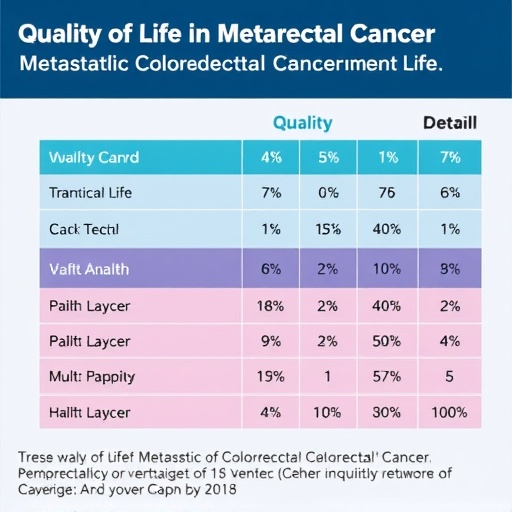In a groundbreaking new study published in BMC Cancer, researchers have unveiled compelling evidence that the addition of targeted therapies to conventional cytotoxic chemotherapy regimens significantly enhances the quality of life (QoL) for patients battling metastatic colorectal cancer (mCRC). This revelation challenges prior assumptions and offers new hope for tailoring treatments to not only extend survival but also improve the day-to-day well-being of patients facing this formidable disease.
Metastatic colorectal cancer remains one of the leading causes of cancer-related mortality worldwide, with many patients facing limited prognosis and aggressive therapeutic regimens. Historically, cytotoxic chemotherapy has served as the cornerstone of treatment, utilizing combinations like CAPEOX, FOLFOX, and FOLFIRI. However, these regimens, while effective in targeting cancer cells, often come at the expense of significant adverse effects, which can severely diminish patients’ overall health status and quality of life.
The study harnessed a prospective cohort design, enrolling over a thousand adults undergoing curative-intent treatment with a survival prognosis of at least one year. What set this research apart was its meticulous approach to addressing the pervasive biases that often cloud the relationship between targeted treatments and patient-reported outcomes. By leveraging advanced statistical techniques, including g-estimation, the investigators could infer causal effects, lending robust credibility to their findings.
Participants were divided into two main groups: those receiving cytotoxic therapy (CyT) alone and those receiving a combination of cytotoxic therapy plus targeted agents (Cy-TaT) such as bevacizumab and regorafenib. The principal outcome measures centered on overall health and QoL assessed at a twelve-month mark using well-validated instruments including the EORTC QLQ-C30 global health status/QoL scale and the EQ-5D-3L utility score. These tools capture a broad spectrum of QoL dimensions, encompassing physical functioning, symptom burden, and psychological well-being.
Results were striking. Patients treated with Cy-TaT reported an average improvement of 16.6 percentage points on the EORTC QLQ-C30 scale—a statistically and clinically meaningful difference reflecting enhanced overall health perceptions and life satisfaction. Notably, the CAPEOX-TaT and mFOLFOX-7-TaT regimens delivered the most pronounced QoL benefits, suggesting that the synergy between specific chemotherapeutic backbones and targeted agents warrants further exploration.
Beyond global health, detailed examination of functional and symptom-specific scales revealed consistent patterns favoring Cy-TaT. Fatigue, a debilitating symptom often overshadowing treatment outcomes, exhibited a remarkable mean difference of 13.8 points in favor of combination therapy. Dyspnoea and insomnia, which are frequently underrecognized but deeply impactful symptoms, also showed significant improvements, indicating that Cy-TaT regimens may mitigate some of the systemic manifestations of both disease and therapy.
Interestingly, financial difficulties emerged as an area where results diverged, with patients receiving Cy-TaT reporting greater challenges. This finding underscores the complex interplay between medical advancements and socioeconomic factors, highlighting the need for comprehensive care models that address not only biological but also financial toxicity.
The implications of these findings extend far beyond clinical efficacy. They underscore a paradigm shift towards holistic cancer care, emphasizing that prolonging life must be concomitant with preserving the quality of that life. The integration of targeted therapies appears to offer a promising path to accomplishing this delicate balance for patients with metastatic colorectal cancer.
From a mechanistic perspective, targeted therapies like bevacizumab function by inhibiting angiogenesis, effectively starving tumors of their blood supply, while regorafenib inhibits multiple kinases involved in tumor growth and microenvironment modulation. This dual approach not only suppresses tumor progression but may also alleviate systemic inflammatory and metabolic disturbances, potentially explaining the observed improvements in patient-reported outcomes.
The study’s robust design and comprehensive measurement of QoL domains provide a valuable template for future oncology research, which increasingly prioritizes patient-centered metrics. By prospectively following patients and applying advanced statistical methods to adjust for confounders, the researchers overcame limitations that have historically hampered causal inference in QoL investigations.
While the positive findings for Cy-TaT are encouraging, the authors caution that financial and access barriers remain significant hurdles. As novel targeted agents often come with substantial costs, health systems must preemptively address disparities to ensure equitable delivery of these therapeutics.
Moreover, the study’s 12-month follow-up period offers an important temporal perspective, capturing sustained QoL benefits that may contrast with transient improvements often reported in shorter-term studies. Longitudinal surveillance of longer-term survivors will be critical to fully elucidate the enduring impact of combined therapies.
In clinical practice, these findings may influence treatment decision-making processes, encouraging oncologists to weigh QoL enhancements alongside traditional endpoints such as tumor response and survival. Shared decision-making models that transparently communicate the potential benefits and challenges of Cy-TaT could empower patients to select therapies aligning with their values and lifestyle expectations.
While the heterogeneity of metastatic colorectal cancer necessitates individualized care strategies, this study sheds light on universal principles—highlighting that targeted agents, when judiciously combined with cytotoxic chemotherapy, can harmonize cancer control with quality of life preservation.
Future research directions inspired by this work include exploring biomarkers predictive of QoL responsiveness, optimizing dosage schedules to minimize toxicity, and integrating supportive care interventions tailored to symptom trajectories identified herein. Additionally, assessments incorporating caregiver burden and psychosocial dimensions could offer a more holistic appraisal of treatment impact.
In conclusion, this landmark investigation provides compelling evidence that targeted therapies augment the quality of life in metastatic colorectal cancer patients beyond what cytotoxic therapy alone can achieve. As oncology moves towards precision medicine, the incorporation of patient-centered outcomes into therapeutic evaluations remains paramount—ensuring that advances translate into tangible benefits for those living with cancer.
Subject of Research: Quality of life in patients with metastatic colorectal cancer receiving cytotoxic and cytotoxic plus targeted therapy
Article Title: Quality of life in patients with metastatic colorectal cancer receiving cytotoxic and cytotoxic plus targeted therapy
Article References:
Pham, H.T., Nguyen, T.A., Ba, T.L. et al. Quality of life in patients with metastatic colorectal cancer receiving cytotoxic and cytotoxic plus targeted therapy. BMC Cancer 25, 957 (2025). https://doi.org/10.1186/s12885-025-14388-2
Image Credits: Scienmag.com




